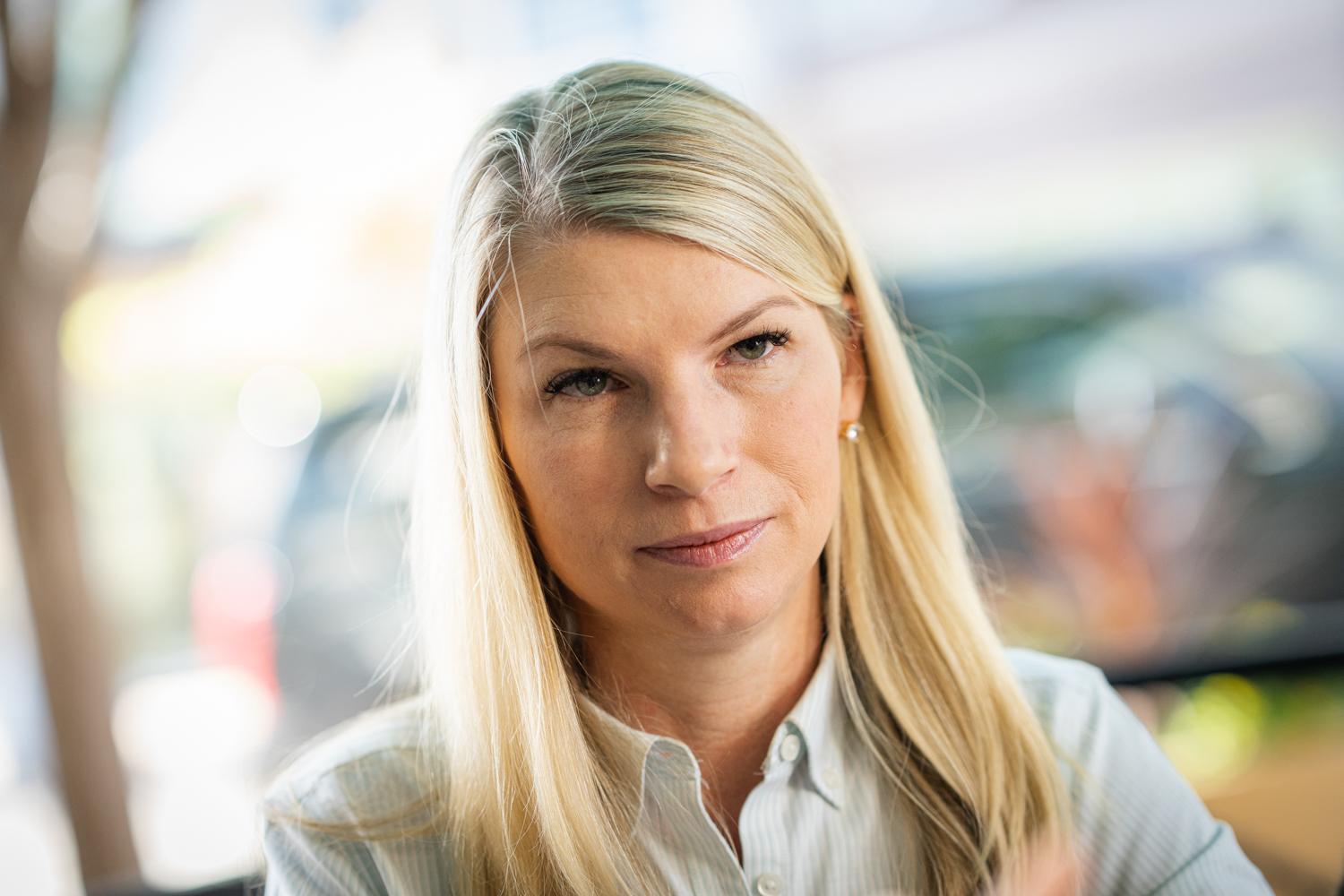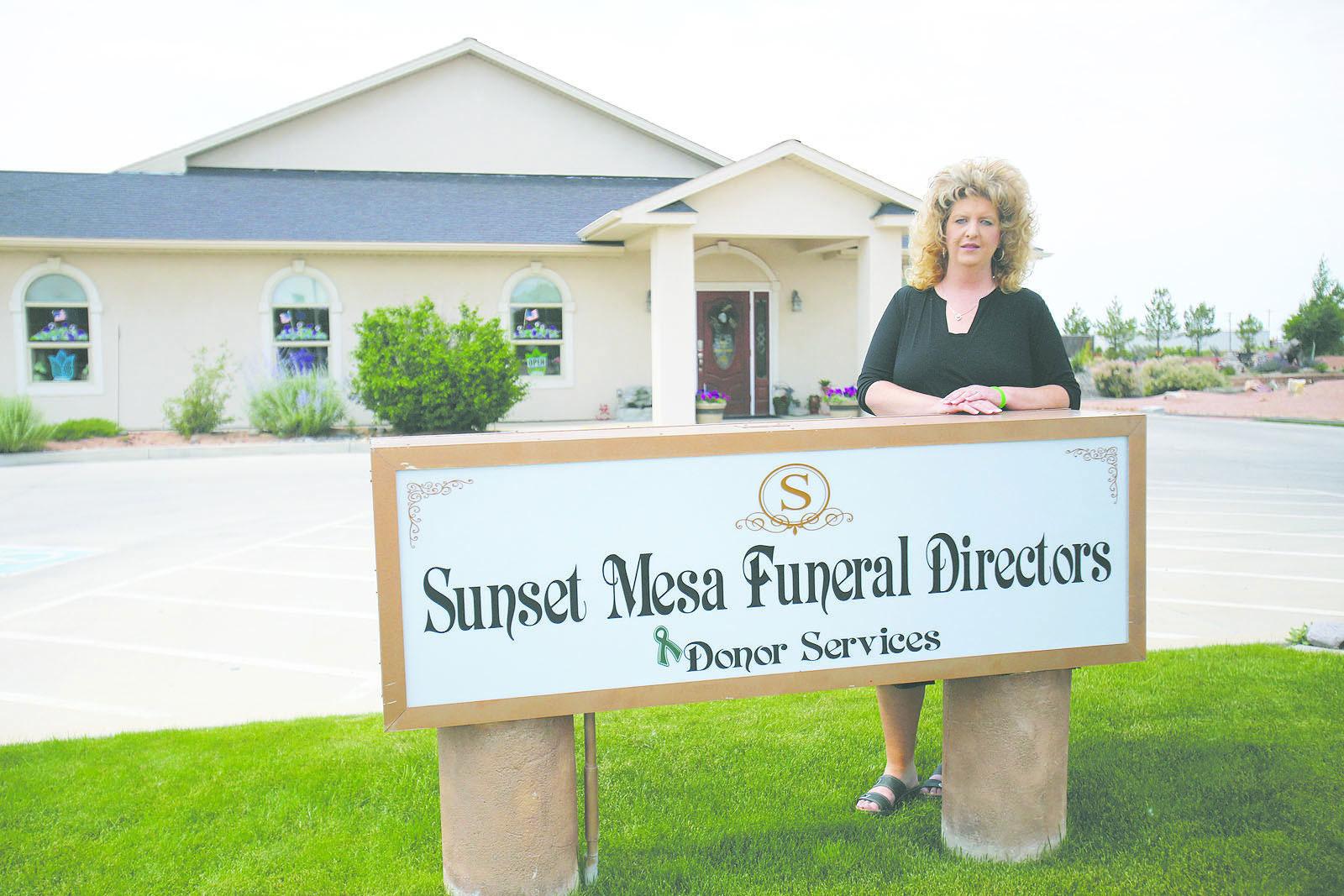
Looking at Brittany Pettersen’s resume, most voters would not be surprised that she wants to be the next congress member from Colorado’s 7th congressional district.
Pettersen served three terms as a Representative at the State House before being elected to the state Senate in 2018, in a highly competitive race. She was one of five Democratic women who won the chamber's most contested races that year; the so-called“Fab Five” helped flip control of the State Senate.
But sitting outside a coffee shop in her hometown of Lakewood in late August, Pettersen said she never expected to run for office.
She said it was “highly unlikely” for someone with her upbringing — or so she thought.
“I'm a regular person. I grew up in a family that struggled. I was a high-risk youth,” she said.
That risk came from her mother, who became addicted to opioids when Pettersen was a child. “That's when our childhood went from being a normal middle-class family to a completely different one of struggling,” she said. “She turned to using heroin. You can imagine what our lives were like as kids, with a mom who struggled with a very severe disease. Addiction is a disease.”
Pettersen said she and her brothers got support from the community around them in Jefferson County.
“It was because [of] my access to great schools and teachers that believed in me that I was able to overcome those barriers and become the first of my family to graduate from high school and college,” she said. “My brothers and I faced a lot of obstacles, but we were given a shot. We were so lucky to grow up in this community, in a place where the community investments that were made gave us the opportunity to build a better life.”
That’s also why she got involved in politics. “I thought about how many people like me gave up their power by not voting. So, I started getting involved, registering voters, volunteering on campaigns.”
She had originally planned on running for Congress in 2017, when the current Rep. Ed Perlmutter briefly said he was retiring after a short-lived gubernatorial run. Instead, Perlmutter reversed course and Pettersen dropped out of the race. She said it turned out for the best; her mother relapsed and Pettersen was able to focus on getting her help.
When Perlmutter announced his retirement earlier this year, Pettersen was the first Democrat to jump into the race.
“We need regular people who understand the struggles that so many families are facing,” she said. “I have dedicated nearly my entire career to public service, dedicating it to bettering people's lives here in the community. That's made me who I am. So that's why I was very excited at the opportunity to eventually step up.”
She quickly lined up the support of Perlmutter and other Congressional Democrats, a roster of endorsements that helped her avoid a costly primary in a district where she has many ambitious colleagues.
Although redistricting made the seat more competitive, CO-7 remains Democratic leaning. Additionally, Pettersen has more campaign cash than her Republican opponent, Erik Aadland. However, a larger war chest does not guarantee victory, especially with political headwinds favoring Republicans this fall, as inflation and crime weigh on the minds of many voters.
Still, Pettersen has spent time traveling the new contours of the district, which is no longer solely based in the Denver suburbs, but rather stretches south into the mountains, “getting to better understand the specific issues, the unique issues that they're facing.”
She mentioned issues from the housing crisis to fires and the need for mitigation to water conservation. “Those are unique challenges to that space. But they're all facing the same challenges with struggling to get by. You know, the lack of opportunity and frustration to barely be able to make it. And that is seen across the district.”
While she is based out of Jefferson County, Pettersen said if elected she would open an office in Canon City, located in the heavily Republican Fremont County.
On the issues
Unlike Aadland, Pettersen has experience as a lawmaker. Aside from some tough races, she also faced a recall effort over some of the bills she has supported. It ultimately failed when organizers did not gather enough signatures.
She said making policy is much different than being on the campaign trail or even an activist. It requires more compromise, and a willingness to not let the perfect be the enemy of the good.
“I've had to work on numerous bills where in order to get it passed, I had to give up pieces that I really wanted to include,” she explained. “I was able to ultimately pass a bill that didn't go as far as I wanted, but that was able to move the ball in the right direction.”
She highlights a bill to increase access to contraception, which was able to pass a Republican controlled state Senate, while she was a representative. She said that was because she was able to build relationships, treat people with respect and “work across the aisle to try and find common ground.”
Family planning has been a recurring theme for Pettersen as a state lawmaker. Last year she successfully sponsored a bill to raise the income level for people to qualify for contraception and other reproductive health care through Medicaid. And earlier this year she signed on to the Reproductive Health Equity Act, which codifies legal abortion in state law.
Watching her mother’s long struggle with addiction, Pettersen has also spent much of her time at the legislature focused on opioid legislation. In 2017, she headed a special committee that developed a package of bills to prevent opioid abuse and increase help for those with addictions.
But in the glass-half-empty world of politics, Pettersen’s experience also means she has a voting record — one that Aadland and other Republicans have been hitting her on during the campaign, especially her vote in favor of a 2019 bipartisan bill that made possession of four grams or less of a Schedule 1 or 2 drug a misdemeanor, rather than a felony. Republicans have blamed that law for contributing to the rise of fentanyl deaths in the state.
Pettersen calls the attacks over her support for the bill “disgusting,” especially given her family’s experience.
“I have led on this issue and brought national leading policies to increase access to treatment and recovery services,” Pettersen said. “Colorado voters also believe that we shouldn't criminalize addiction. We need to be going after the cartels and the people that are exploiting our communities, not the people like my mom who need healthcare support, not jail.”
When it comes to dealing with addiction, Pettersen disappointed some of her supporters when she decided not to introduce a bill to allow a supervised injection site. She said the idea should not move forward at the state level.
Like many Democrats, Pettersen believes climate change is “the greatest threat we face.” She said investments need to be made now to help with the transition. She would like to see more federal dollars allocated to updating the nation’s energy grid. She also thinks the private sector will play a key role in innovating to move away from fossil fuels, such as developing technology to improve energy storage. She added that, in the meantime, the nation still has energy needs, and supports natural gas as it’s a much cleaner alternative than coal and oil.
To deal with the rising cost of living, Pettersen said she’d like to see policy solutions that involve what she describes as tax fairness — streamlining the system, while still encouraging investment — and helping families with costs, such as investing in early childhood education and the free and reduced lunch program for students. When it comes to increasing access to child care, she’d like to see Congress act to encourage more child care businesses to open in so-called child care deserts.
As for affordable housing, she thinks there needs to be more directed building incentives, so developers just don’t focus on luxury apartments or houses, but address the housing needs of more people across the income spectrum, including workforce housing.
Pettersen said she would support reform of the Electoral Count Act — the bill moving through Congress to avoid future conflicts over the outcomes of presidential elections — and banning stock trading by members of Congress. Regarding the package of bipartisan public safety bills the House passed in late September, Pettersen said she supports updating police training, as well as investing in alternative responses. She noted the track record of Denver’s STAR program, which sends trained health care professionals or social workers to some low-level 911 calls to connect people with necessary services, leaving police officers to focus on violent crime.
If elected, Pettersen said her aim would be to get onto at least one high profile committee that aligns with her background, such as Energy and Commerce or Ways and Means. But she understands, as a freshman lawmaker, it would be unlikely to happen.
She noted the Financial Services Committee and the Science, Space and Technology Committee would help the district, and she joked that there will be vacancies on both (they’re two of the committees Perlmutter has been serving on). She also said she’d be pleased to get on the House Committee on Education and Labor. As for caucuses, she said she would like to join the New Democrat Coalition, made up of centrists.
Win or lose, she said she’s glad to have this opportunity to run.
“There's a lot of times that I've kind of pinched myself, you know, going back to my old neighborhood, my schools that changed my life,” she said. “When I think back about that little girl and everything that I had to overcome — I was given a chance because of those community investments…. it's an honor to be in this position to fight for our future.”








